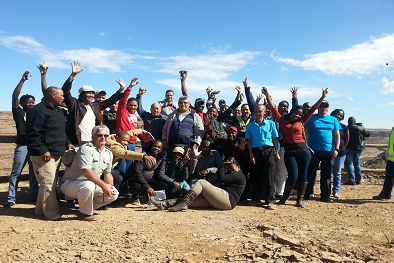After the four day training workshop, stakeholders had an understanding of Transboundary Water Resources Management issues and how these can be addressed; had an appreciation of how to contribute to the development and implementation of the Orange Senqu Basin IWRM plan; and where aware of how implementation of the Basin IWRM plan will build climate resilience and a water secure basin. The training was facilitated by Piet Heyns, Viviane Kinyaga and Rennie Chioreso Munyayi. The training took place at the Central Lodge in Keetmanshoop, Namibia from 5-8 August 2014 and was organized by the Desert Research Foundation of Namibia (DRFN).
Twenty-four stakeholders, three female and twenty-one male attended the workshop. The participants were mainly land use planners, development facilitators, forest rangers, councilors, resort managers, chief wardens, independent water consultants, researchers, traditional authorities, village council representatives and managers from municipalities.
Participants were taken through a two-part training programme. The first component had a strong emphasis on Water Resources Management functions at the River Basin scale considering that some of the stakeholders were relatively new to the Basin Management Committee and IWRM issues.
Participants were therefore taught the basics of IWRM, Legal and institutional framework for Water Resources Management in Namibia, Water Resources Management planning at basin scale, Water Resources Management functions and the role and functions of the Orange Fish Basin Management Committee. Participants were also provided with information on the interaction between the various water users, how they impact on the water resources, and are impacted by the other users, as well as the opportunities for implementation of IWRM.
The second component of the programme focused on introducing the concepts of Transboundary Water Resources Management, Climate Change and the basic concepts of stakeholder engagement and mainstreaming gender in IWRM project planning and implementation. By being capacitated in these areas, participants are expected to make contributions towards the ORASECOM Basin-wide IWRM Plan currently under development.
All the participants affirmed that the training was relevant for the Orange Fish Basin Management Committee and the field trip to the Neckartal Dam was very informative. One participant summed it up by saying “the training course was very informative and I learnt a lot of new information that is worthwhile for my work, the basin management committee and my studies”.
This training is among other up-coming country trainings that will be held under the ‘Mainstreaming Climate Change into the Water Sector within the SADC Region’ project that GWP SA is implementing under the GiZ Transboundary Water Resources Management Programme Phase III in SADC. The goal of the project is to ensure that more investments are made in the management and development of shared water courses to ensure water security and improve climate resilience, through strengthening cross-sectoral national engagement to integrate water issues into socio-economic development and climate change adaptation processes. A follow-up workshop from this training is expected to be held at a later date and will cover topics in water governance, infrastructure development and TWM initiatives in the Orange Senqu Basin.
Story by Patricia Lumba, Rennie Chioreso Munyayi and Viviane Kinyaga
